IMPORTANT SAFETY INFORMATION
- Do not take RYALTRIS if you are allergic to olopatadine hydrochloride, mometasone furoate monohydrate or any of the ingredients in RYALTRIS. Ask your healthcare provider if you are not sure.
- RYALTRIS can cause sleepiness or drowsiness. Do not drive, operate machinery or do anything that requires alertness until you know how RYALTRIS affects you.
- Do not drink alcohol or take any other medicines that may cause you to feel sleepy while using RYALTRIS.
RYALTRIS may cause serious side effects, including the following:
- Sleepiness or drowsiness.
- Nose and throat problems. Symptoms of nose and throat problems may include: nosebleeds, sores (ulcers) in the nose, hole in the cartilage between your nose (nasal septal perforation). Symptoms of nasal septal perforation may include: crusting in the nose, nosebleeds, runny nose and/or a whistling sound when you breathe.
- Slow wound healing. You should not use RYALTRIS until your nose has healed if you have a sore in your nose, if you have had surgery on your nose or if your nose has been injured.
- Fungal infection in your nose and throat (thrush, or Candida). Tell your healthcare provider if you have any redness or white-colored patches in your nose or mouth.
- Eye problems, including glaucoma or cataracts. You should have regular eye exams when using RYALTRIS.
- Allergic reactions. Call your healthcare provider or get emergency medical
care if you have any of the following signs of a serious allergic reaction: wheezing, rash, hives, swelling of your face, mouth, and tongue and breathing problems.
- Immune system problems that may increase the risk of infection. Taking medicines that weaken your immune system makes you more likely to get infections. These infections may include tuberculosis (TB), ocular herpes simplex infections, and infections caused by fungi, bacteria, viruses, and parasites. Avoid contact with people who have contagious diseases, such as chickenpox or measles, while using RYALTRIS. If you come in contact with someone who has chickenpox or measles, call your healthcare provider right away. Symptoms of infection may include: fever, aches or pains, chills and tiredness.
- Adrenal insufficiency. Adrenal insufficiency happens when your adrenal glands do not make enough steroid hormones. Symptoms of adrenal insufficiency can include: tiredness, weakness, nausea, vomiting and low blood pressure.
- Slowed growth in children. A child’s growth should be checked regularly while using RYALTRIS.
Call your healthcare provider or get medical help right away if you have symptoms of any of the serious side effects listed above.
- The most common side effects of RYALTRIS include unpleasant taste, nosebleeds and nasal discomfort.
- Tell your healthcare provider if you have side effects that bother you or do not go away.
- These are not all of the possible side effects of RYALTRIS. For more information, ask your healthcare provider or pharmacist.
Tell your healthcare provider about all the medicines you take, including prescription and over-the-counter medicines, vitamins and herbal supplements. RYALTRIS and other medicines may affect each other, causing side effects.
Especially tell your healthcare provider if you take:
- Certain medicines for HIV, cobicistat-containing products, certain antifungals, certain antibiotics and/or certain antidepressants. Ask your healthcare provider or pharmacist for a list of your medicines if you are not sure.
Before you use RYALTRIS, tell your healthcare provider about all of your medical conditions, including if you:
- Have had recent nasal sores, nasal surgery or nasal injury.
- Have eye or vision problems, such as cataracts or glaucoma (increased
pressure in your eyes).
- Have tuberculosis or any untreated fungal, bacterial or viral infections or eye infections caused by herpes.
- Have been near someone who has chickenpox or measles.
- Are not feeling well or have any other symptoms that you do not
understand.
- Are pregnant or plan to become pregnant. It is not known if RYALTRIS will harm your unborn baby. Talk to your healthcare provider if you are pregnant or plan to become pregnant.
- Are breastfeeding or plan to breastfeed. It is not known if RYALTRIS passes into your breast milk. Talk to your healthcare provider about the best way to feed your baby while using RYALTRIS.
INDICATIONS
RYALTRIS is a prescription nasal spray that contains 2 medicines, olopatadine hydrochloride, an antihistamine, and mometasone furoate, a corticosteroid. RYALTRIS is indicated for the treatment of symptoms of seasonal allergic rhinitis in adult and pediatric patients 12 years of age and older.
For more information, please see Full Prescribing Information.
To report an adverse event or product complaint, please contact us at [email protected] or call 1-877-845-0689 or 1-800-962-8364.
Adverse events may also be reported to the FDA directly at 1-800-FDA-1088 or https://www.fda.gov/medwatch.
RYALTRIS and the RYALTRIS logo are registered trademarks of Glenmark Specialty SA.
Distributed by: Hikma Specialty USA Inc. Columbus, OH 43228
Reference
- RYALTRIS® Nasal Spray approved prescribing information, Glenmark Specialty SA, Switzerland.



